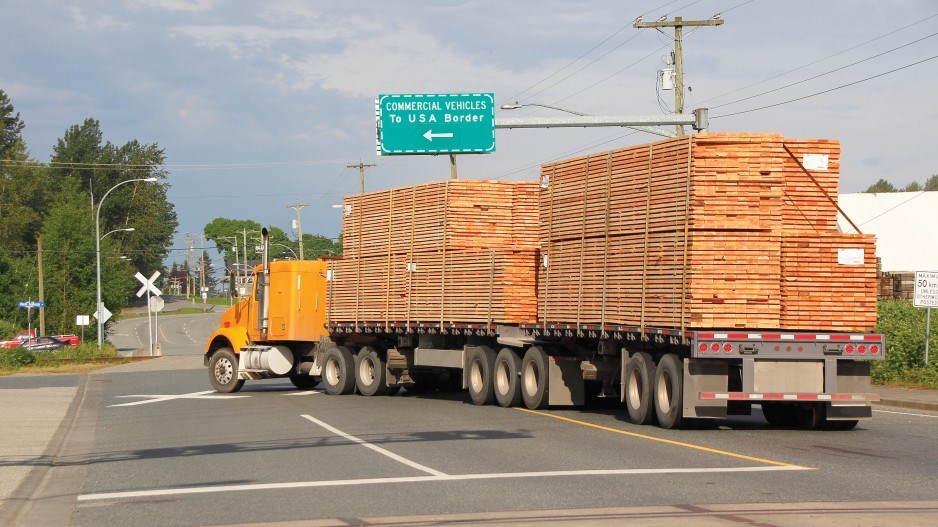The Trump administration has imposed punishing duties on Canadian softwood lumber exports in response to complaints by the U.S. lumber sector that Canada subsidizes its forest industry.
Sawmillers will begin paying countervailing duties averaging close to 20% on lumber shipments to the U.S. beginning May 1. The U.S. Department of Commerce department ruling of subsidy is the first of two blows expected by the Canadian softwood sector. A second anti-dumping duty determination is to be announced June 23.
(See also: U.S. levies duties on Canfor, West Fraser, Tolko)
B.C. is expected to bear the brunt of the American trade action as its industry accounts for $4.6 billion a year in lumber shipments to the U.S. – more than half of total Canadian lumber exports to the U.S.
The imposition of the duty marks the beginning of the fifth lumber war between Canada and the U.S. since the 1980s, when producers in the U.S. Northwest first alleged that Canadian provinces subsidize their industries by charging below-market process for timber harvested from Crown lands. The allegations have never stood up to legal challenges, but Canada has invariably negotiated a settlement in exchange for lumber peace. The last agreement expired in October 2015.
The U.S. action has been expected by producers and consumers on both sides of the border, and U.S. lumber prices have risen 30% over the past few months in anticipation of the duty. The current price jump will buffer the immediate impact on Canadian producers, Susan Yurkovich, President of the BC Lumber Trade Council, said at a news conference in Vancouver Tuesday.
However, Yurkovich cautioned, lumber prices are volatile, and she fears smaller B.C. companies will be hit the hardest when the next price dip occurs.
"This is going to create a constraint for B.C. companies that are operating here," she said. "Prices are volatile – they go up and they go down, and we don't know what the actual impact on B.C. industry in total will be."
The BC Lumber Trade Council is already working with the provincial and federal governments to find ways of reducing those inevitable impacts, such as providing transitioning funds for workers who lose their jobs, Yurkovich said.
Council co-chair Duncan Davies, CEO of Vancouver-based Interfor, said the immediate impact on his company will be reduced profitability. He referred to the U.S. action as "a shakedown," by U.S. producers.
The Department of Commerce levied the duties after investigating five Canadian lumber companies. It assigned specific rates to each company. They are:
•Canfor, 20.26%
•J.D. Irving, 3.02%
•Resolute Forest Products, 12.82%
•Tolko, 19.5%
•West Fraser Timber, 24.12%.
The rest of the Canadian industry is being levied an average of these five rates but will be penalized further as the rates will be retroactive to Jan. 31.
Yurkovich called the process unprecedented and arbitrary. It makes no sense, she said, other than to pit Canadian companies against each other, as some will be paying more than others.
"It's one of the particularly egregious pieces of what came out of yesterday," she said of the U.S. ruling. “These duties are unwarranted, and this determination is completely without merit."
The duty will affect U.S. consumers as well, Yurkovich said, by driving up the price of housing. U.S. lumber demand exceeds what that country's own industry produces, and the difference has traditionally been made up by Canada.
Forest Products Association of Canada chief executive Derek Nighbor said in a news release that the association expects the duties will ultimately hurt "hard working men and women in our mill communities across Canada.”
Meanwhile, the U.S. Lumber Coalition applauded the ruling, saying it is the first step in levelling the playing field between Canadian and American producers. Their goal is to expand their industry, Cameron Krauss, legal chair of the U.S. Lumber Coalition and a senior vice-president of Oregon's Seneca Sawmill, said in a news release.
He said the Department of Commerce ruling "confirms that Canadian lumber mills are subsidized by their government and benefit from timber pricing policies and other subsidies which harm U.S. manufacturers and workers."
Not all Americans support that stand. The U.S. National Association of Home Builders says that even a 15% tariff would cost 4,600 American jobs and $265 million in lost wages and salaries in the U.S. residential construction and renovation industry alone.
NAHB Chairman Granger MacDonald, a homebuilder and developer from Kerrville, Texas, said the association is "deeply disappointed in this short-sighted action by the U.S. Department of Commerce that will ultimately do nothing to resolve issues causing the U.S.-Canadian lumber trade dispute but will negatively harm American consumers and housing affordability."
The Canadian government called the duties baseless and unfounded.
"The government of Canada disagrees strongly with the U.S. Department of Commerce's decision to impose an unfair and punitive duty," Natural Resources Minister Jim Carr and Foreign Affairs Minister Chrystia Freeland said in a statement.




